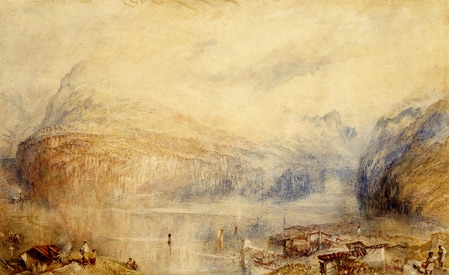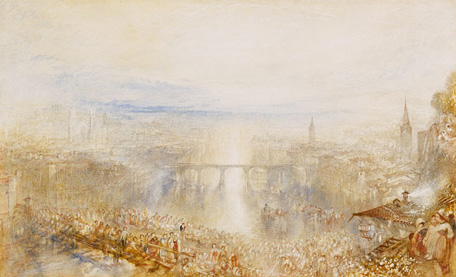When Turner travelled up the Rhine into Switzerland in the summer months of 1841/42 and visited Zurich, his fame in the English art trade was based chiefly on his book illustrations and topographical series. Working from on-the-spot sketches, he produced so-called “sample studies” for private clients. The “Fete Day” is the second of the two Zurich panoramas that he produced in the 1840s, both depicting the local populace in the foreground drawn as if by magic to the lake and the light. It was painted in 1845 for the English collector B.G. Windus and has been in the possession of the Kunsthaus Zürich since 1976.
Kunsthaus Zürich |
The Windus Commissions JMW Turner had not accepted any commissions from BG Windus despite requests over the years, as he depended on his patron buying works which he had already painted. However he finally accepted a commission from BG Windus in 1844 – 1845 when the two were reconciled after a falling out. The two paintings were Lake of Lucerne from Brunnen 1845 and A Fete Day in Zurich, Early Morning 1845, and cost 80 guineas each. BG Windus later presented the two drawings to his son and daughter. John Ruskin was not impressed by A Fete Day in Zurich which was offered to him by William Edward Windus before he sold it in 1858. But he was keen to buy the Lake of Lucerne painting from Mrs de Putron; he had earlier asked BG Windus to give him first refusal, if he should ever be tempted to part with it. However by then the price was too high and the painting was sold to a picture dealer for £420 in 1865. |
From The Windus Papers - Turner, Ruskin and the Pre-Raphaelites - sold at Bonhams in 2009.
Further letters from JMW Turner to BG Windus including:
Further letters from JMW Turner to BG Windus including:
From The Windus Papers - Turner, Ruskin and the Pre-Raphaelites - sold at Bonhams on24 March 2009
This letter from JMW Turner to BG Windus refers to commissions and a falling out between patron and painter:
'an especially important account of how he sought commissions on and subsequently worked-up the late Swiss watercolours [including the celebrated Rigi views]'
My inadvertance arose in this way - Mr G. offered and it appears to me the shortest way for to ascertain how far my employ for my own use, when out upon my Summer trips, might be made on approval of by my admiring friends: in being carried on or left, in their chance state when done from Nature thus, for instance 20 were selected, but it turns out that they could not be uniform by size and work without being carr[ied] forward and therefore it struck me the best way would be to take fresh pieces of paper of a uniform size and follow the same idea and keep the original sketch in its primitive state. - hence by progression said paper became the Drawings but took so much time that the 20 were reduced to 10... I did certainly not point out any mode for Mr G. because I thought of every thing being equally and clear, open to all opinions and hoped an inward satisfaction of knowing or feeling that while previously trying to please myself subsequently to please my friends - so my dear Sir remove the land-mark of your displeasure and let us all three be right again..."
Mr G refers to the agent Thomas Griffith
This letter from JMW Turner to BG Windus refers to commissions and a falling out between patron and painter:
'an especially important account of how he sought commissions on and subsequently worked-up the late Swiss watercolours [including the celebrated Rigi views]'
My inadvertance arose in this way - Mr G. offered and it appears to me the shortest way for to ascertain how far my employ for my own use, when out upon my Summer trips, might be made on approval of by my admiring friends: in being carried on or left, in their chance state when done from Nature thus, for instance 20 were selected, but it turns out that they could not be uniform by size and work without being carr[ied] forward and therefore it struck me the best way would be to take fresh pieces of paper of a uniform size and follow the same idea and keep the original sketch in its primitive state. - hence by progression said paper became the Drawings but took so much time that the 20 were reduced to 10... I did certainly not point out any mode for Mr G. because I thought of every thing being equally and clear, open to all opinions and hoped an inward satisfaction of knowing or feeling that while previously trying to please myself subsequently to please my friends - so my dear Sir remove the land-mark of your displeasure and let us all three be right again..."
Mr G refers to the agent Thomas Griffith


